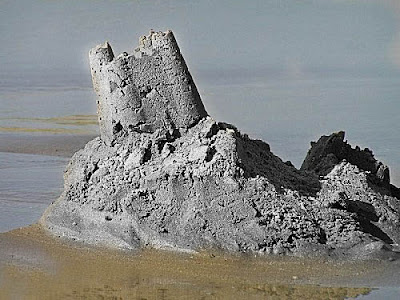Turkey,Slovenia,Germany,Syria,Italy: Five places to expect a crisis this summer ...
LONDON (MarketWatch) — The phrase “sell in May and go away” dates back to the days when City of London brokers would start abandoning their desks and preparing for a summer of socializing at the races, the cricket, or the tennis at the first sign of spring.
It doesn’t have much relevance to a world where we are all tethered to our iPhones wherever we are.Nobody stops paying attention to the markets just because they aren’t sitting at their desk, and they wouldn’t survive for long in their jobs if they did.
These days, it is not May, but the late summer and early autumn that should make everyone nervous. It is in August and September that the markets have a nasty habit of collapsing.
Take the FTSE-100 index /quotes/zigman/3173262 UK:UKX +0.94% , for example. It plunged in the summer of 2002, and then again in the summer and autumn of 2008, and the biggest correction of the post-credit crunch rally was in the early autumn of 2011. The same is true of most other major bourses.
You can debate endlessly why the market drops in the summer. Maybe the weather takes people’s mind off work. Perhaps the optimism of the new year has faded by then. Or it could simply be a coincidence.
Whatever the reason, with most major markets close to all-time highs, it would be foolish to ignore the possibility of a sharp correction now that the sun is starting to shine again and the days are getting longer.
So where might we see a crisis this summer? Here are five countries that investors should be worrying about, because any one of them could be the trigger for the next market collapse.

Istambul has had one of the hottest markets.
Turkey: With an economy expanding at up to 9% annually, Turkey has been one of the hottest emerging markets of the last three years. It has a huge, young work force, and is well-placed between Europe and Asia. It has been growing as fast as China, but without the hype. Stocks have soared, and bond yields have dropped sharply. The Istanbul bourse /quotes/zigman/1708031 XX:XYUZO +0.01% has more than doubled since 2008.
But now Turkey is slowing down fast, in part because Europe is slipping into depression. Growth was down to 1.7% in the latest quarter, half the expected rate. Foreign capital has poured into Turkey in search of high returns, but may get out just as quickly. If a Turkish crash triggers a flight from emerging markets, it will rock the markets.
Slovenia: The former Yugoslav republic was a fast-growing ex-Communist state in the years immediately after it reclaimed its independence. Then it joined the euro /quotes/zigman/4867933/sampled EURUSD +0.32% . It has experienced most of the same problems as other small nations — Ireland, Cyprus, Portugal — in the single currency.
Capital flooded in, created a property and lending bubble, and now it has all gone bust and everyone is squabbling about how to clean up the mess. Non-performing loans at the banks are above 20%. They will have to be bailed out somehow. The European Union won’t find it so easy to play the morality card (feckless, work-shy Greeks, money-laundering Cypriots) as it did elsewhere. But it is no more likely to fund a rescue than it was in Cyprus.
Slovenians will have to pay for it themselves, and the banks will take huge losses. If its depositors get fleeced as they did in Cyprus, that may be the trigger for bank runs in Italy and Spain — and every market in the world will panic.
Germany: Germany? Surely that is the strong man of Europe, the powerhouse that bails out the rest of the continent?
Angela Merkel faces an election in September Since the euro crisis erupted, no leader of a major country has been re-elected. Why should Frau Merkel be any different? Voters don’t like the bailouts, and a downturn in their own economy won’t make them any happier. A new anti-euro party may peel enough votes from the center-right to deny her an outright victory.
Investors have been counting on German leadership (and wallets) to hold the euro together. But the election may produce no clear winner, and the polls could be showing that by September. If investors suspect deadlock after the election they will be spooked.
 Reuters
ReutersSyria’s civil war has dragged on for two years
Syria: The civil war has dragged on for two years now with no clear end in sight. But when the Assad regime crumbles, the endgame may be very nasty. Over the years, it has sought chemical weapons every bit as assiduously as any of its neighbors.
If the endgame is very brutal, involving massacres and widespread civilian casualties, outside powers might feel forced to intervene. But military conflict in the Middle East — no matter how well-intentioned — is never going to send the markets anywhere but down.
Italy: Installing Enrico Letta as the new moderate prime minister in Italy has been cheered by the markets. The Milan bourse is up sharply and bond yields have dropped. Milan’s MIB index /quotes/zigman/1482176 XX:FTSEMIB +1.04% is up from 15,000 to almost 17,000 since the chaotic election.
Letta looks like Mario Monti, but elected: he is moderate, pro-reform, and a supporter of the euro. The trouble is, the deal that installed him as PM makes former PM Silvio Berlusconi the real power in the land. Letta is dependent on him for a majority in Parliament.
Berlusconi can pull the plug at any time — and Berlusconi has drifted into the anti-euro camp. He can allow Letta to take the blame for a collapsing economy, then ride back to power himself on a wave of anti-euro rhetoric. Once that game plan becomes clear, Italian markets will plunge again.
Of course, it may well be somewhere else entirely. The world is never short of potential catastrophes. But those are the five places most likely to bring the bull rally of 2013 to a juddering halt before the leaves have finished falling from the trees.
Matthew Lynn is a financial journalist based in London. He is the author of "Bust: Greece, the Euro and the Sovereign Debt Crisis," and he writes adventure thrillers under the name Matt Lynn.

By Matthew Lynn
May 1, 2013
www.marketwatch.com

